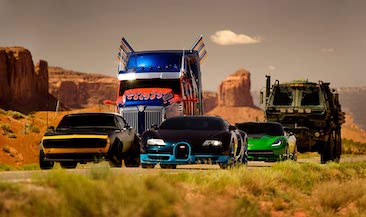The Number One Movie in America:Transformers 4 & 5
By Sean Collier
August 10, 2020
It would take a long time to explain why the fourth and fifth movies in the “Transformers” movies are very bad.
People have tried; there are lengthy YouTube series about the many, many ways that the latter chapters of the alien-robot series failed even by the franchise’s own low standards. For these purposes, though, let’s just say that everything about “Age of Extinction” and “The Last Knight” is unavoidably awful.
The scripts are dreadful, meandering slogs. The characters are thinly drawn and carelessly embodied by a disinterested cast. The effects are digital nonsense, a constant and indistinct blur of uninteresting virtual metal. Each is a full hour too long. The few jokes fall flat; the conflicts are somehow both too vast and insufficiently urgent.
Also, Mark Wahlberg’s accent has no business in Texas.
They’re almost unparalleled in their sheer crappiness, is the point. We already know that, though. So let’s instead take a brief look at how “Age of Extinction” and “The Last Knight” failed economically.
The first three Transformers films — which aren’t exactly “Casablanca,” but have more competence than the two that followed — were smash hits. The 2007 original pulled in $319 million; its direct sequel, 2009’s “Revenge of the Fallen,” represents the pinnacle of the series’ earnings, crossing the $400 million mark. 2011’s clunkily titled “Dark of the Moon” dipped a bit, but it’s hard to care when you’re still making $352 million.
Perhaps that’s all the Transformers anyone wanted.
Three years later, “Age of Extinction” pulled in a domestic total of $245 million. To be sure, that’s still a lot of money. It is, however, an eye-popping drop of more than $107 million from one chapter to the next. “Age of Extinction” still managed a $100 million opening weekend, but fell off a cliff from there amid terrible word-of-mouth.
As an aside: I should note that “Age of Extinction” may not have actually made $100 million in its opening frame. A particularly stupid controversy holds that Paramount fudged the numbers in pursuit of the coveted nine-digit weekend, while more reliable metrics had the figure around $97.5 million.
Is it silly to mess with data to say you crossed an arbitrary dollar amount? Yes, of course. Would Paramount have gladly taken $97.5 million rather than the next film’s bow? Oh yeah.
2017’s bloated “The Last Knight” made $130.1 million total. For a tentpole with a budget north of $250 million, that’s a disaster — especially in light of an opening weekend south of $45 million, a more than 50% drop from the previous film. In just six years, domestic interest in the Transformers had eroded by nearly two-thirds.
On the year-end charts, “The Last Knight” finished behind “Wonder.” Do you remember “Wonder,” with Jacob Tremblay? No, you don’t. And it outgrossed a dang Transformers movie.
Admittedly, this series shifted its focus to the global market long ago; “The Last Knight” made more money in China alone than it did in North America. Even with a successful global cume, however, reports indicate that it lost more than $100 million for Paramount.
If your movie can pull in more than a half-billion dollars worldwide and somehow lose $100 million at the same time, you made a movie wrong.
Then again, most of the Transformers empire comes back to that habit: making movies wrong.
“Transformers: The Last Knight” and “Transformers: Age of Extinction” are the respective subjects of the latest episodes of The Number One Movie in America, a look back at past box-office champions. Each episode’s film is drawn at random from a list of every number-one movie since 1982. (Yes, we somehow drew adjacent Transformers movies on consecutive weeks.) Please listen and subscribe!
Next time: A much better kind of alien.




